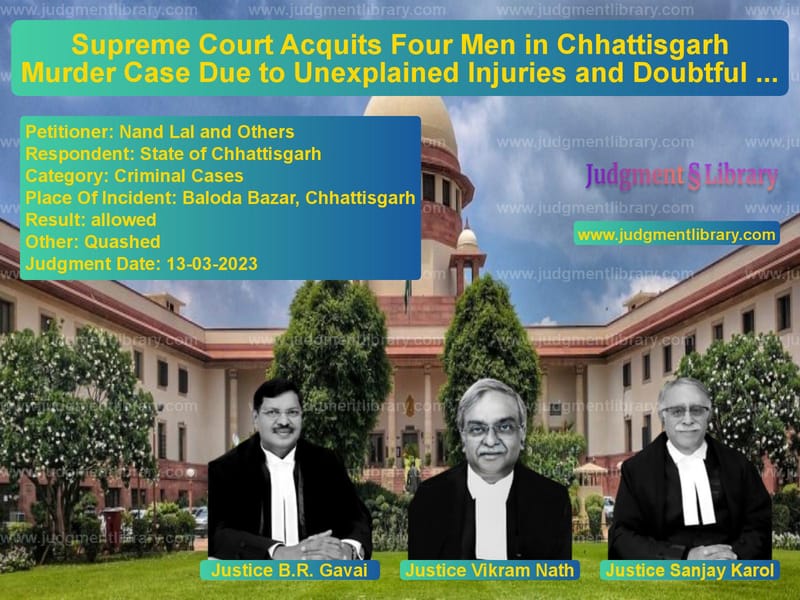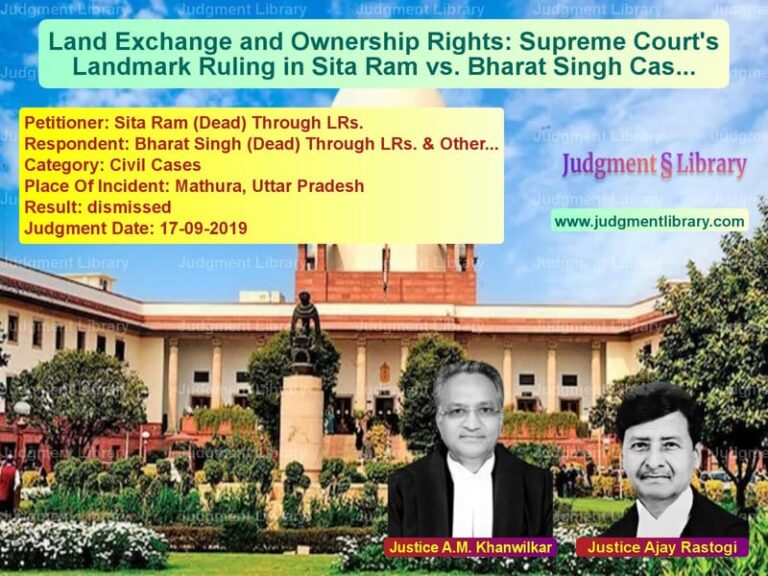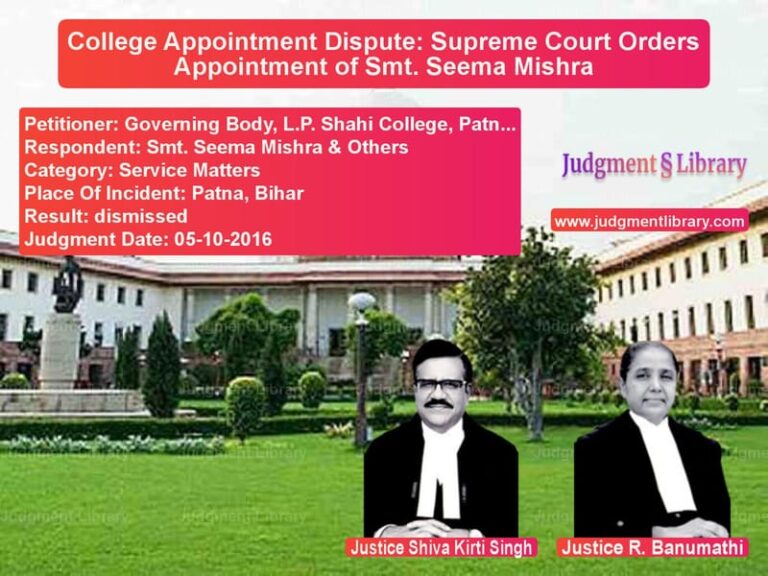Supreme Court Acquits Four Men in Chhattisgarh Murder Case Due to Unexplained Injuries and Doubtful Evidence
The Supreme Court of India has acquitted four accused in a long-running murder case from Chhattisgarh, ruling that the prosecution failed to prove its case beyond a reasonable doubt. The case involved the brutal murder of Kartikram in 2006, in which several accused were convicted under Section 302 of the Indian Penal Code (IPC) and sentenced to life imprisonment. However, after reviewing inconsistencies in the prosecution’s evidence, the Supreme Court overturned the conviction of four accused, giving them the benefit of the doubt.
Background of the Case
The case revolves around an attack that took place on the night of November 3, 2006, in Baloda Bazar, Chhattisgarh. According to the prosecution, Naresh Kumar (Accused No. 11) first assaulted Atmaram (PW-1). Following this, Naresh Kumar and a group of armed men attacked the house of Kartikram, brutally assaulting him and his family members, including Mangtin Bai (PW-2), Khomlal (PW-9), and Purnima Bai (PW-13). The assault led to the death of Kartikram on the spot.
The injured individuals traveled to Baloda Bazar to seek medical attention, but the doctor refused treatment without a police report. They subsequently went to the Suhela Police Station, where an FIR was registered.
Trial Court Conviction and High Court Ruling
The trial court convicted all 12 accused under Section 302 IPC and sentenced them to life imprisonment. The Chhattisgarh High Court upheld the conviction. However, several of the accused filed appeals before the Supreme Court, seeking a re-examination of the evidence.
Arguments by the Appellants (Accused)
- The FIR was lodged several hours after the incident, raising suspicions about its authenticity and whether it had been modified to include additional accused.
- Naresh Kumar (Accused No. 11) sustained multiple grievous injuries on the same night, including fractures and deep wounds. The prosecution failed to explain how he suffered these injuries.
- The prosecution suppressed important evidence, including the first report that was allegedly lodged by Atmaram (PW-1) and Naresh Kumar (Accused No. 11).
- The prosecution’s witnesses—Mangtin Bai (PW-2), Khomlal (PW-9), and Purnima Bai (PW-13)—were close relatives of the deceased and had a motive to falsely implicate the accused.
- There was a long-standing enmity between the two groups due to village elections, which created a strong motive for false accusations.
- The incident occurred at night during a power outage, making it improbable that the eyewitnesses could have clearly identified the accused.
Arguments by the Respondents (State of Chhattisgarh)
- The prosecution argued that the delay in lodging the FIR was natural, given the circumstances in which the victims had to travel to multiple locations before reaching the police station.
- The injured witnesses were present at the scene, making their testimonies reliable despite minor inconsistencies.
- The accused were part of an unlawful assembly, and even if they had not actively assaulted the victims, their presence at the crime scene made them culpable under Section 149 IPC.
- The High Court and trial court had both found the witnesses credible, and their testimony should not be disregarded.
Supreme Court’s Observations and Ruling
The Supreme Court carefully analyzed the evidence and pointed out several serious flaws in the prosecution’s case:
- The injuries sustained by Naresh Kumar (Accused No. 11) were significant, yet the prosecution did not provide any explanation. This failure raised serious doubts about the actual sequence of events.
- The FIR was delayed by approximately four hours, despite the police having prior knowledge of the incident. The unexplained delay weakened the credibility of the prosecution’s version.
- The names of three accused (Nand Lal, Bhagwat, and Ramdular) did not appear in the initial reports, including the inquest panchnama and spot panchnama, raising concerns about whether they were falsely implicated later.
- The eyewitnesses were all close family members of the deceased, and their testimony lacked corroboration from independent witnesses.
- The prosecution failed to produce strong forensic or medical evidence linking the accused to the crime.
The Court ruled:
“When the prosecution fails to explain injuries sustained by an accused, and there is a delay in lodging the FIR, the possibility of false implication cannot be ruled out.”
Final Judgment
The Supreme Court acquitted the four appellants—Nand Lal, Bhagwat, Ramdular, and Naresh Kumar—on the grounds of benefit of doubt. The Court’s directions included:
- The convictions and sentences imposed by the High Court and the trial court were set aside.
- The appellants were ordered to be released immediately unless required in another case.
- The Court emphasized that judicial officers must carefully scrutinize evidence in cases involving group enmity to prevent wrongful convictions.
Legal Precedents Cited
- Lakshmi Singh v. State of Bihar (1976) – Established that unexplained injuries on an accused person weaken the prosecution’s case.
- Ramesh Baburao Devaskar v. State of Maharashtra (2007) – Highlighted that delays in lodging FIRs can cast doubt on the credibility of the prosecution’s case.
- Vadivelu Thevar v. State of Madras (1957) – Discussed how the reliability of eyewitness testimony should be assessed.
Implications of the Judgment
The ruling has several significant implications:
- Higher Standards of Proof: Reinforces the principle that mere presence at the crime scene is not enough to sustain a conviction.
- Fair Trial Principles: Ensures that the benefit of the doubt is given to the accused when the prosecution fails to establish a clear and credible narrative.
- Prevention of Misuse of Law: Guards against enmity-driven false accusations, especially in cases involving long-standing disputes.
- Burden of Proof on Prosecution: Emphasizes that unexplained injuries on an accused must be accounted for to ensure impartial justice.
Conclusion
The Supreme Court’s decision in Nand Lal & Others vs. The State of Chhattisgarh sets an important precedent in criminal law, reaffirming that the prosecution must establish guilt beyond a reasonable doubt. By acquitting the four accused due to unexplained injuries and inconsistencies in the prosecution’s case, the Court has reinforced the principle that justice must be based on clear and credible evidence. The ruling serves as a crucial reminder that courts must remain vigilant against wrongful convictions based on unreliable witness testimony and delayed FIRs.
Petitioner Name: Nand Lal and Others.Respondent Name: State of Chhattisgarh.Judgment By: Justice B.R. Gavai, Justice Vikram Nath, Justice Sanjay Karol.Place Of Incident: Baloda Bazar, Chhattisgarh.Judgment Date: 13-03-2023.
Don’t miss out on the full details! Download the complete judgment in PDF format below and gain valuable insights instantly!
Download Judgment: nand-lal-and-others-vs-state-of-chhattisgar-supreme-court-of-india-judgment-dated-13-03-2023.pdf
Directly Download Judgment: Directly download this Judgment
See all petitions in Murder Cases
See all petitions in Bail and Anticipatory Bail
See all petitions in Judgment by B R Gavai
See all petitions in Judgment by Vikram Nath
See all petitions in Judgment by Sanjay Karol
See all petitions in allowed
See all petitions in Quashed
See all petitions in supreme court of India judgments March 2023
See all petitions in 2023 judgments
See all posts in Criminal Cases Category
See all allowed petitions in Criminal Cases Category
See all Dismissed petitions in Criminal Cases Category
See all partially allowed petitions in Criminal Cases Category







